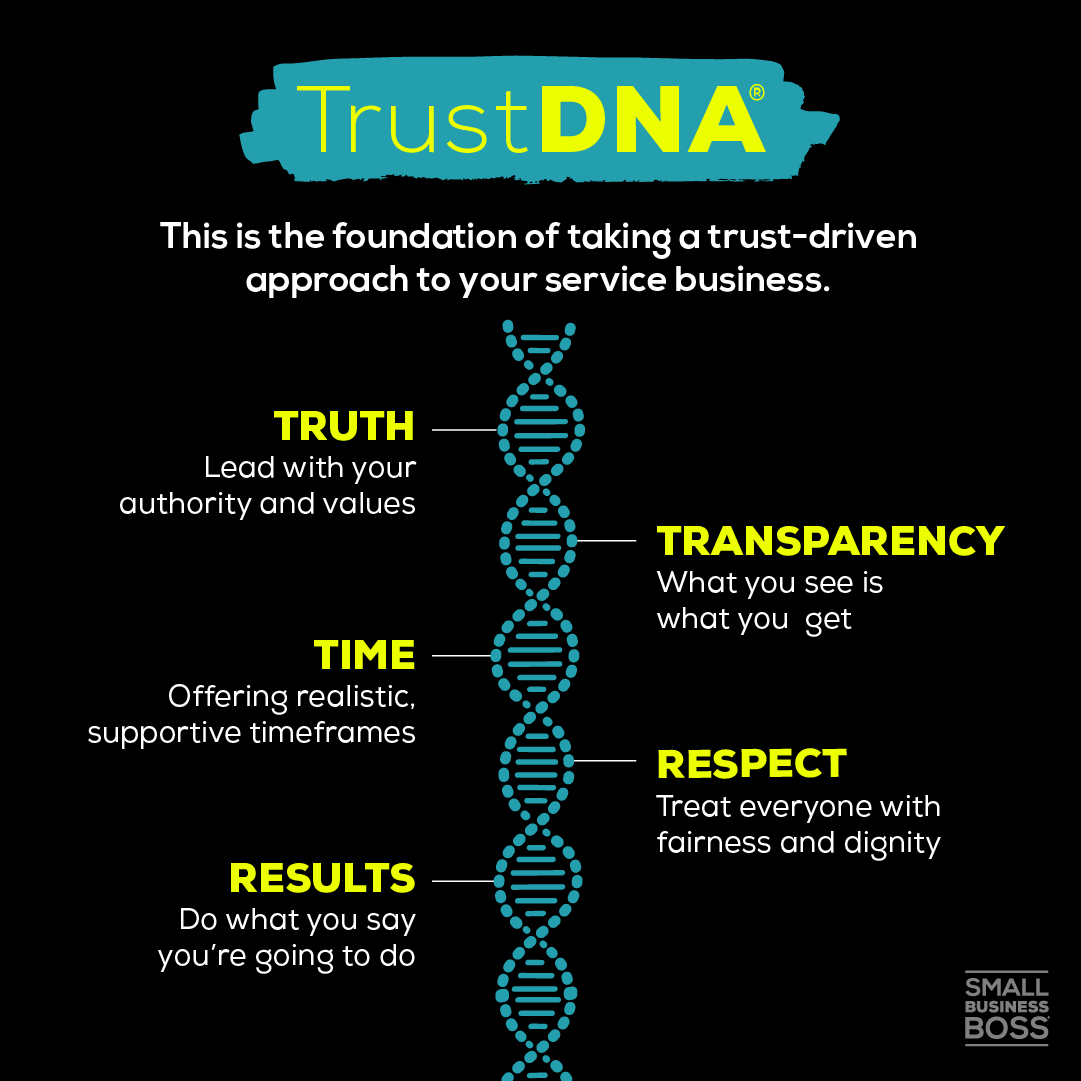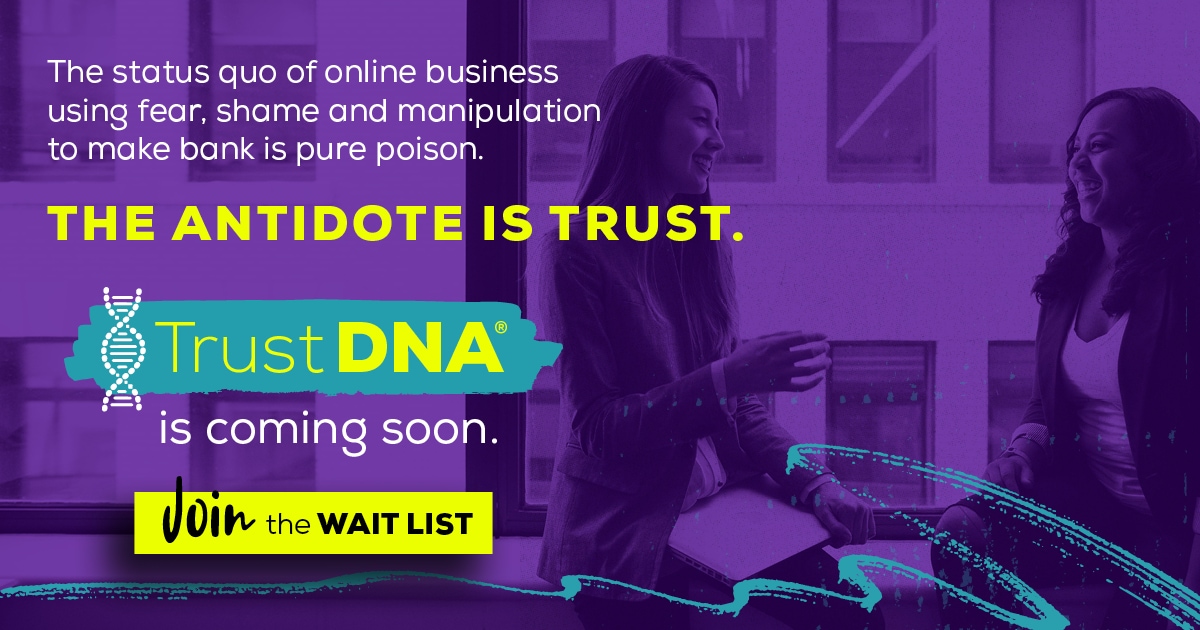The Antidote to Fear-Based Marketing & Sales:
Introducing TrustDNA®
By Maggie Patterson
All opinions in this post are my opinions and mine alone.
Table of Contents
Listen Now To This Essay On The BS-Free Service Business Show
Trust is essential to our relationships, yet a fear-based approach to marketing and sales is everywhere. In this episode we’re exploring why that is, why fear is a terrible strategy and, more importantly, what to do instead.
Over the last six months I’ve started talking more and more about how essential trust is in our businesses, especially when it comes to sales and marketing.
I know, the idea of focusing on trust seems obvious, but the reality is that in the age of online business, much of what’s being taught out there is based on fear.
And that fear is poisoning our businesses in countless ways.
Why Trust?
There are many definitions of trust, but in this case, as the antidote to the fear-based marketing and sales poison, it’s a verb. It’s the belief in the reliability, truth, ability and strength of something.
Trust is the foundation of any relationship. In your personal life, I’m sure you’ve experienced the challenge of building a relationship with someone when you don’t trust them. Or trying to repair one when trust has been broken.
There’s a reason the phrase trust issues exists. Because without trust on both sides of any relationship, it’s hard to have a healthy relationship of any kind.
Ultimately, our business is about our relationship with others including our wider community as well as potential, existing and past clients. That’s why our marketing, sales and service need to be rooted in trust above all else.
The Edelman Trust Barometer 2021 shows how trust has been put to the test in 2020, and says we’re facing a state of information bankruptcy. In this climate, trust in all information sources including search engines, traditional media, owned media and social media is at an all-time low.
Interestingly, the study found that businesses are now trusted more than the government in 18 of 27 countries, and are the only institutions seen as both ethical and competent. 68% of respondents agreed that CEOs should step in when the government doesn’t fix societal problems.
While the category of “business” is broad and includes everything from multinational corporations to small businesses, it shows a shift in expectations that impacts all of us as business owners.
In an environment where trust is already shaky, and people are trusting information less and less, I’d like to think the sun is setting on these fear-based strategies.
Finally, as someone who’s built every business I’ve ever had (and there have been a few), leading with trust has never steered me wrong. From telling clients in my big agency days to not spend money on something, to leaving space for people to make the right decision for them, trust is baked into every single thing I do.
Trust is the literal DNA of my business.


Introducing TrustDNA®
The more vocal I’ve become about the issues I see in online business, the more I’ve been asked for solutions to what’s going on.
Offering up solutions seems like it’d be a no-brainer, but it turned out to be much more complicated than I ever imagined. Even with years of experience as a business owner, and an entire career that’s been about building trust, I didn’t want to offer up another cookie cutter solution.
The last thing anyone needs is another step-by-step system that jams them and their business into a narrow way of doing things. I don’t know about you, but I’ve tried those things over the years, and they never fit. They feel like I’m wearing pants that are two sizes too small, which is both uncomfortable and makes me feel all kinds of crappy.
Owning a business is hard enough, and we don’t another damn thing that messes with our marketing, sales or service.
Which is where TrustDNA comes in. It’s a framework for building a trust-driven approach to your business, and the five trust cores will help guide you to figuring out the right approach for you.
Critical thinking is 100% required, as what works for me to build trust with my potential clients is unique to my business, and what you need to do may be a little, or even a lot different.
At the heart of TrustDNA are what I call the trust cores. Think of these building blocks of TrustDNA for your business. They’re like the chains of nucleotides that are linked into chains for your DNA. (I know, that just got a little science nerd-like.)

Since first introducing the trust cores a few months ago, I’ve added one more as it’s a crucial part of building and maintaining trust. Now let’s dive into each one.

TRUTH
Lead with your authority and values
I often feel like the truth is in short supply in online business. From bullshit credentials to carefully crafted imagery to twisting the truth to make sales, fear and fakery are everywhere.
From my perspective, this is no way to run a business, and it must be exhausting to feel like you’re always about to be found out.
The flip side to this is being honest about your qualifications, staying in your zone of genius, selling to people you can actually help, and owning your mistakes with your clients. And that’s just for starters.
For me, truth is about being in integrity no matter what, leading with your true authority and being very clear about what you stand for.
TRANSPARENCY
What you see is what you get
You know how there’s that text on your side mirror of your car saying “objects in the mirror are closer than they appear”? In online business we need a label that says “people may seem faker than they appear”.
When it comes to trust, transparency goes hand in hand with the truth. While someone may be truthful, it doesn’t automatically mean they’re transparent. This is really and truly the territory of embellishment and taking liberty with the facts.
Transparency is really about ensuring that what you see is what you get. That’s why things like embellished revenue claims, curated vulnerability, and not providing pricing upfront go into the lacking in transparency bucket. I’d also add anything designed to trick people into buying by not telling the whole story or offering up incomplete information.
With TrustDNA, these tactics shift towards responsible and respectful storytelling, not making revenue claims without context, clear and easy to find pricing, and communicating expectations.
TIME
Offering realistic, supportive timeframes
Time is the new addition to the trust cores, and it’s the result of constantly coming back to the reality that building trust takes time, and time is a factor in building a successful business.
Yes, I know, there’s a whole camp of entrepreneurs who think they can bend time, but I firmly believe that time is essential to building trust. And lack of time is a big reason why people end up with a raging case of buyer’s remorse.
Time is a factor in fear-based sales tactics as it pressures people into buying, and artificial scarcity is used to ratchet up fear of missing out. I also see it when people set unrealistic expectations about results, or limit access to leaders as their time is valued above all else.
To lead with trust, we need to eliminate urgency, and focus on creating interaction that gives people the space to make decisions. We need to normalize people waiting as long as they need to decide to work with us, and providing our customers/clients with the time they need to get results.
RESPECT
Treat everyone with fairness and dignity
The online world is typically driven by what are called parasocial relationships, a term coined by Horton and Wohl in 1956.
A parasocial relationship is a one-sided relationship with a media personality. With social media, these are your relationships with your favorite celebrity entrepreneur, Youtuber or TikTok sensation, and that relationship is built on you following, liking or subscribing.
While these relationships are generally considered normal, when coupled with fear-driven tactics, it can lead to a lack of respect. While you may look up to a celebrity entrepreneur (and consider them someone you’d be friends with), they’re more concerned about building a relationship with you in order to turn you into a paying customer.
Where you respect them, they’re consistently disrespecting you through their messaging and marketing. This shows up in messages that degrade people by sorting them into categories (like those passive aggressive “this is not for you if” sections on sales pages), and marketing that’s designed to get you on board as a follower.
Another place disrespect shows up is in the sales process where their elevated status is used to pressure you into buying, or leveraging exclusivity as a way to play on your sense of belonging.
Then, once you buy, the pattern of disrespect continues, as you’re pressured to buy the upsell, consistently shut down by the leader or subjected to toxic positivity. Even as a paying customer, the parasocial relationship continues.
Without mutual respect, you can’t have trust, and these one-sided relationships make it easy for disrespect to thrive.
As a business owner treating everyone with respect and dignity is one of the most powerful ways to build trust. Best of all, it costs you nothing.
Respect starts with being helpful and kind above all else, and recognizing that even if someone isn’t paying you they deserve your respect. Too many times I’ve seen people talk trash about potential clients, and be downright rude.
I’ve seen it in action too many times to count, from belittling someone on a webinar who asked a question, to ongoing BS dished up about being low vibe when someone isn’t ready to invest. While this may cement the person behaving this way as the leader, it’s disrespectful and demeaning.
The other piece of respect is fostering self-trust with potential clients, and ensuring that communication is clear, kind and consistent once someone is your client. Again, this may sound incredibly obvious, but this is something that we all need to pay more attention to as it builds or breaks trust.
RESULTS
Do what you say you’re going to do
One of my long-time mastermind members has a saying about working in online business that’s a running joke, “you just need to be one or two levels above crap”. While it’s sad, it’s true. The bar in online business is so incredibly low and getting results is far less common than anyone wants to admit.
The easiest way to build and keep trust is by doing what you say you’re going to do. I know for me, I typically trust people until they don’t do what they promised, then I start to question everything.
The same is true with your clients. Nothing will trigger doubts about you and chip away at trust faster than not being impeccable with your word.
The status quo of online business relies heavily on results not typical testimonials and overselling what the offer can really do for you. There’s a consistent lack of clarity about potential ROI and then once someone buys, responsibility for results is shifted to the client.
The alternative?
If you want to have relationships based on trust, share client stories that aren’t just the top 10% of your clients, manage expectations in the sales process, and most of all, set your clients up to be successful. Then, deliver as promised, and do so on time, everytime.
TrustDNA® is the Future

This may all sound simple, but it definitely takes commitment. We’re going to explore this in more detail in the next three episodes. We’re going to do a deep dive into how to bake TrustDNA into the three pillars of your service business: marketing, sales and service.
In each episode, we’ll explore ways we break trust, and ways we built trust so that you can take it away and apply it to your business.
For some of us, it may require deprogramming ourselves from the business as usual BS of online business. For others, it may call on us to look at specific areas of our business where we need to make trust a bigger priority.
I sincerely hope you’re as excited about the TrustDNA approach to your business, especially as it gives you the power to figure out what’s best for you and helps you break free from fear-based strategies and tactics.
Remember, trust is the antidote to all of the status quo of online business. This is how we build better businesses –– ones we’re excited about and can be proud of.


